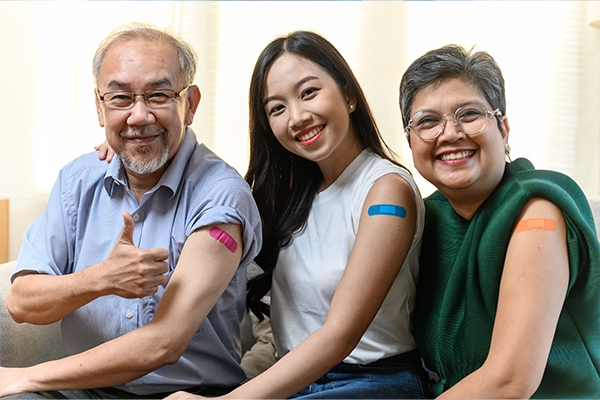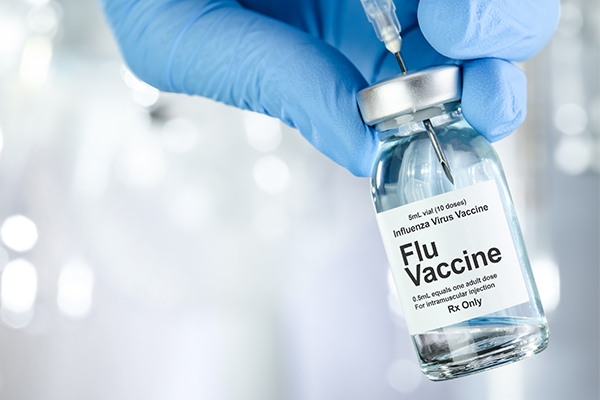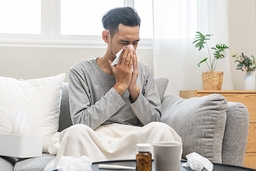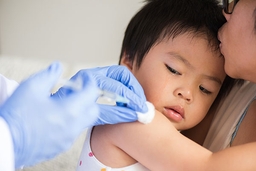You’re Never Too Old for Vaccines—Here’s Why

Vaccines protect your health. You’re never too old to get vaccinated!
When you hear the word “immunization,” what often comes to mind is a toddler being carried to the health center, a small syringe, and crying afterwards.
However, vaccinations are not just for children. Adults also need vaccines, both for personal protection and as part of their social responsibility to maintain public health. In fact, some vaccines may be required for work, school, travel, or specific activities.
Why do adults need vaccines?

As we age, our immune systems weaken, making adults, especially seniors, more susceptible to infections. Protection from childhood vaccines can wane or disappear altogether, and some vaccines may not have been given.
Lifestyle, occupation, and certain health conditions can also increase your risk of contracting infectious diseases that could have been prevented by immunization.
1. Vaccines have saved millions of lives—and they’re still needed
For over 100 years, vaccines have been a vital pillar of disease prevention. While vaccines are familiar to us, the threat of infectious diseases remains.
Protection from some vaccines can wear off, and you may need a booster dose. For example, a tetanus booster is recommended every 10 years to prevent severe infections from wounds.
2. Vaccines protect you and your loved ones
Vaccines help your body make antibodies—protective proteins that fight infections.
Getting vaccinated not only protects you, but it also helps prevent the spread of the disease to others, especially those who are too old or have certain medical conditions that prevent them from receiving vaccinations. This is part of developing herd immunity, which protects the entire community.
3. Prevention is better than a cure
Vaccines can prevent serious illness, serious complications, and even death. Rather than waiting to get sick and needing hospitalization, getting vaccinated is a much safer and more cost-effective way to stay healthy in the long term.
4. Vaccines are safe and closely monitored
Most people experience only mild side effects after vaccination, such as soreness at the injection site, fatigue, or a mild fever. These reactions usually resolve within a few days. Serious side effects are extremely rare, and vaccine safety is closely monitored by health authorities worldwide.
5. Vaccines may be required for various activities
Some vaccines are required for specific purposes, such as attending school, working in a health care setting, or traveling to certain countries. For example, older adults need to get vaccinated to prevent the spread of disease in high-risk settings.
Read more: Saudi Arabia Adds Vaccination Requirements.
What vaccines do adults need?

Here are some types of vaccines recommended for adults, based on recommendations from the Indonesian Ministry of Health and also global recommendations from the WHO and CDC (Centers for Disease Control and Prevention):
1. Influenza (Flu) vaccine
This vaccine needs to be given every year, especially to the elderly, pregnant women, people with chronic diseases (such as asthma, diabetes, and heart disease), and health workers. The flu virus mutates every year, so protection must be updated regularly.
2. Hepatitis B vaccine
Many adults have never received the hepatitis B vaccine, even though this disease can cause chronic liver damage and even cancer. When we were babies, we usually received this vaccine, but over time, our immunity can decrease.
This vaccine is essential for individuals working in the healthcare sector or those at high risk of infection. However, this vaccine is also required if you are 60 years or older and have certain risk factors, or if you just want to be protected from infection. All adults should be screened for hepatitis B infection with a blood test at least once. This vaccine is given in 3 doses.
3. Tetanus, Diphtheria, and Pertussis (Tdap) vaccine
This vaccine is recommended every ten years. Pertussis (whooping cough) can be very dangerous if transmitted to infants, so it is essential for adults, especially those living with infants, should get this vaccine.
4. HPV (Human Papillomavirus) vaccine
HPV can lead to cervical, anal, and throat cancer. This vaccine is recommended for men and women up to the age of 26 and can be administered up to age 45 under certain conditions.
This vaccine is given in 2-3 doses, depending on the age at which the first dose is given.
Read more: HPV Vaccination Fulfill Your Satisfaction Safely.
5. Pneumococcal vaccine
All adults aged 50 and over need pneumococcal vaccination. Adults under 50 with certain health conditions or other risk factors also need pneumococcal immunization.
Generally, pneumococcal vaccination is given once in a lifetime for the conjugate vaccine form and repeated every five years for the polysaccharide vaccine form.
6. COVID-19 vaccine (booster)
Although the pandemic has subsided, the COVID-19 vaccine remains relevant, particularly for vulnerable populations. Additional boosters are recommended if immunity has decreased.
What happens if adults aren’t vaccinated?
The risk is not just to themselves, but also to others. For example, an unvaccinated adult against pertussis can spread the disease to a baby who is not old enough to be vaccinated. Or, someone who is not vaccinated against the flu can spread the virus to their work environment or family.
On a larger scale, low adult immunization coverage can hinder the formation of herd immunity. This means that diseases that could have been prevented continue to circulate and cause harm.
Immunization constraints in adults
Unfortunately, awareness of the importance of vaccination in adults is still low. Many people believe that vaccinations are only for children, or feel that they are healthy enough. Some people are worried about side effects. In fact, the side effects of vaccines are generally mild and much smaller risk than contracting the disease directly.
Lack of education among health workers, as well as unequal access to vaccines in healthcare facilities, are also significant challenges in themselves.
**
A vaccine is not just an injection. It provides protection. Not only for now, but also for the future. For yourself, your family, and your community.
Recheck your vaccination status. Consult a doctor at the GWS Medika Clinic, a health clinic in Jakarta, to find out which vaccine you need.



